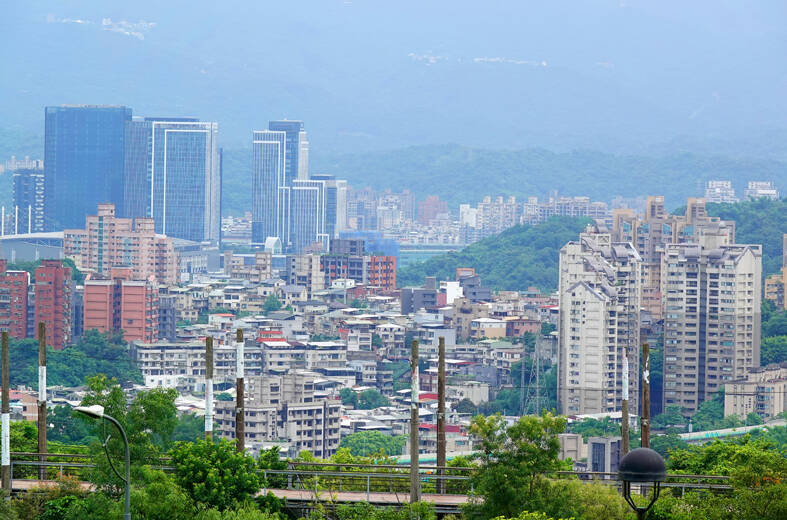Taiwan’s housing boom lost momentum this month when major property brokers reported double-digit percentage declines in deals after the central bank asked lenders to slow mortgage operations to avoid an overconcentration of real-estate lending.
Evertrust Rehouse Co (永慶房屋) transactions shrank 23 percent from one month earlier as people took a summer vacation or shunned closing deals during Ghost Month, Evertrust deputy research head Chen Chin-ping (陳金萍) said.
The slowdown was due to an apparent cash crunch as banks decline or slow mortgage applications to prevent more money from flowing to real-estate properties, Chen said.

Photo: CNA
As of June 30, real-estate lending accounted for 37.4 percent of the banking system’s loans, close to the record of 37.9 percent, the central bank said last week, asking lenders to draw up quantitative control measures by Friday next week detailing how they would limit mortgages to help prevent an overconcentration of real-estate loans.
The central bank is likely to adopt more credit controls next month if voluntary tightening proves ineffective, Chen said.
Transactions dropped 8 percent compared with a year earlier as the low base effect also faded, Chen said.
The government in August last year introduced favorable lending terms, including interest subsidies and a five-year grace period, prompting an influx of first-home buyers.
Chinatrust Real Estate Co (中信房屋) sales this month tumbled 16.4 percent from last month, while flagging 2.5 percent from a year earlier, a Chinatrust broker said.
Chinatrust attributed the retreat mainly to the central bank’s quantitative controls, although the Ghost Month also dampened interest.
Fewer people displayed interest in house-hunting this month, as mortgage applications took longer and many sought help from the Financial Supervisory Commission, Chinatrust said.
Premier Cho Jung-tai (卓榮泰) said he is to meet with the central bank next week to make sure the quantitative controls measures would not affect first-home purchases.
Meanwhile, Taiwan Realty Co (台灣房屋) said its outlets observed a 20.2 percent slump in housing deals this month, or a 15.9 percent decrease from a year earlier.
Several lenders have voluntarily put a halt to new mortgage operations on concerns that their house loans might approach the statutory limit of 30 percent due to house price hikes.

Semiconductor business between Taiwan and the US is a “win-win” model for both sides given the high level of complementarity, the government said yesterday responding to tariff threats from US President Donald Trump. Home to the world’s largest contract chipmaker, Taiwan Semiconductor Manufacturing Co (TSMC, 台積電), Taiwan is a key link in the global technology supply chain for companies such as Apple Inc and Nvidia Corp. Trump said on Monday he plans to impose tariffs on imported chips, pharmaceuticals and steel in an effort to get the producers to make them in the US. “Taiwan and the US semiconductor and other technology industries

SMALL AND EFFICIENT: The Chinese AI app’s initial success has spurred worries in the US that its tech giants’ massive AI spending needs re-evaluation, a market strategist said Chinese artificial intelligence (AI) start-up DeepSeek’s (深度求索) eponymous AI assistant rocketed to the top of Apple Inc’s iPhone download charts, stirring doubts in Silicon Valley about the strength of the US’ technological dominance. The app’s underlying AI model is widely seen as competitive with OpenAI and Meta Platforms Inc’s latest. Its claim that it cost much less to train and develop triggered share moves across Asia’s supply chain. Chinese tech firms linked to DeepSeek, such as Iflytek Co (科大訊飛), surged yesterday, while chipmaking tool makers like Advantest Corp slumped on the potential threat to demand for Nvidia Corp’s AI accelerators. US stock

The US Federal Reserve is expected to announce a pause in rate cuts on Wednesday, as policymakers look to continue tackling inflation under close and vocal scrutiny from US President Donald Trump. The Fed cut its key lending rate by a full percentage point in the final four months of last year and indicated it would move more cautiously going forward amid an uptick in inflation away from its long-term target of 2 percent. “I think they will do nothing, and I think they should do nothing,” Federal Reserve Bank of St Louis former president Jim Bullard said. “I think the

Cryptocurrencies gave a lukewarm reception to US President Donald Trump’s first policy moves on digital assets, notching small gains after he commissioned a report on regulation and a crypto reserve. Bitcoin has been broadly steady since Trump took office on Monday and was trading at about US$105,000 yesterday as some of the euphoria around a hoped-for revolution in cryptocurrency regulation ebbed. Smaller cryptocurrency ether has likewise had a fairly steady week, although was up 5 percent in the Asia day to US$3,420. Bitcoin had been one of the most spectacular “Trump trades” in financial markets, gaining 50 percent to break above US$100,000 and